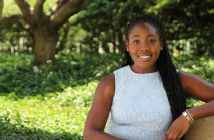On March 28, the Center for Judicial Events & Clerkships (CJEC) in collaboration with Fordham Law Alumni Association and Fordham Law Women during Women’s History Month hosted a panel discussion Fordham Law Women Judges. The panel featured several of Fordham Law’s distinguished women judges on both federal and state courts: Magistrate Judge Katharine Parker ’92 of the U.S. District Court for the Southern District of New York, Senior Judge Loretta Preska ’73 of the U.S. District Court for the Southern District of New York, Acting Justice Joanne Quiñones ’97 of the New York Supreme Court in Kings County, and Associate Judge Madeline Singas ’91 of the New York Court of Appeals.
Abigail Ryckman ’24, 2L president of Fordham Law Women opened the event welcoming the attendees. “This year, Fordham Law Women has pushed a theme of mentorship and friendship, focusing on the help we can ask for and the help we can give to others,” said Ryckman. The student group is celebrating its 50th anniversary this year. “Meeting and conversing with women who are so devoted to paving the way and helping others follow in their path really inspires and invigorates those who follow,” she said. “Judges Parker, Preska, Quiñones, and Singas represent such an amazing legacy for Fordham Law women.”
Assistant Dean Suzanne M. Endrizzi ’96, who moderated the panel noted in her opening remarks: “Fordham Law has been blessed to have a long line of women trailblazers on the federal and state bench. Of the more than 100 Fordham Law alumni currently serving on the bench approximately one-third are women. Today’s panel is a wonderful representation of our women in the judiciary, and we are delighted to have our four panelists who represent a range of different career paths leading towards the bench.”
Inspiring the Next Generation of Lawyers
Together, the judges on the panel discussed their different paths to the bench, the various judicial selection processes, the rewards and challenges of the profession, and the importance of mentorship.
Judge Parker, who practiced labor and employment law at international law firm Proskauer Rose for 23 years prior to ascending to the bench, emphasized that mentorship can come from anybody, in small or large ways. “All of the Fordham judges have been mentors to me, and I went to them when I was interested in becoming a judge to ask them [questions],” said Judge Parker, adding that she also sought counsel from members of her firm, Dean Emeritus John Feerick ’61, and U.S. District Judge Warren W. Eginton of the District of Connecticut, for whom she clerked. “I learned from everybody that I worked with, and I think that if you act like a sponge, you can learn things from everyone that you interact with, even your adversaries.”
“None of us got here on our own, right?” added Judge Quiñones, who has mentored dozens of students. Through a summer internship program the judge affectionately calls “Camp Quiñones,” her mentees—not only law students, but also local high school and college students—learn the “ins and outs” of the justice system. “We all are a part of a village, and we need to make sure that once you climb up that ladder, you don’t pull it up behind you,” she said. “You make sure it stays down so that other people can climb up that ladder and join you.”
Judge Singas—the fifth Fordham Law graduate to sit on New York state’s highest court, the first Fordham Law alumna, and the only graduate to serve in the role in the last 50 years—also explained why she believes mentorship plays a major role in the legal profession. “When I was coming up the ranks, I didn’t have many female mentors because there weren’t that many [women]doing violent crimes litigation in the DA’s office, or in law enforcement,” she said. “So I made it a point to make sure that, when I got into leadership roles, I would be there for women.”
After learning that more than 270 Afghani women judges lost their positions following the Taliban’s takeover of the country in 2021, which was preceded by the killing of two judges on the Afghani Supreme Court earlier that year, Judge Singas felt compelled to respond. In her first year on the bench, she helped launch a new program called Judges for Career Opportunities for Refugees in conjunction with the New York state’s Unified Court System. The program, better known as “J-COR,” provides career placement opportunities in the New York court system for Afghan refugees with law-related experience or interest. To date, about 10 women and men have been placed in New York state’s court system through this initiative.
“You should also not underestimate the importance of the Fordham reputation in the judiciary,” said Judge Preska, who celebrated her 30th year on the bench last year. “For example, Fordham had judges on the New York Court of Appeals for a 50-year stretch and … now we have Judge Singas [serving there]. We have big representation in the judiciary, and you should keep that in the back of your mind.”
The panel discussion was immediately followed by a brief Q&A and a networking reception, during which the judges graciously spoke with Fordham Law community members.




